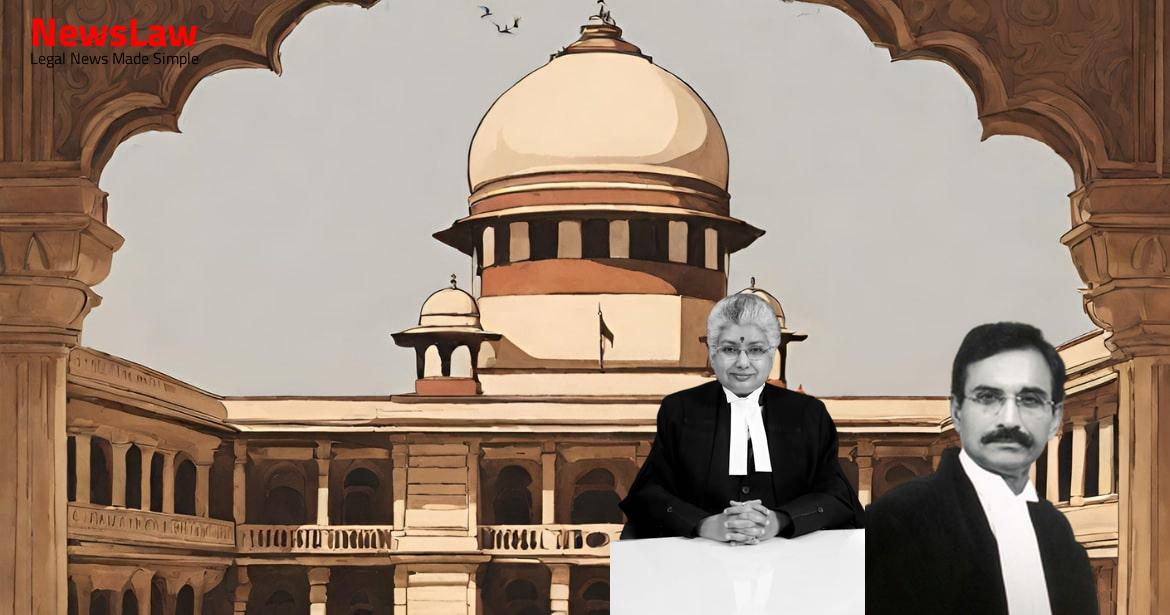Delve into the legal intricacies of a recent High Court judgment where the validity of the Repealing Act, 2018 was challenged. The Court’s analysis centered on the legislative competence of the State Legislature to enact and later repeal certain laws regarding the appointment of Parliamentary Secretaries. Stay tuned to explore the nuances of this significant legal development.
Facts
- The 2012 Act and the Repealing Act, 2018 were challenged before the High Court of Manipur.
- The High Court of Manipur declared the 2012 Act and the Repealing Act, 2018 as unconstitutional.
- PIL Nos. 7, 9 and 10 of 2017 were filed in the High Court of Manipur challenging the validity of the 2012 Act.
- The validity of the Repealing Act, 2018 was also challenged in the High Court of Manipur through Writ Petition (C) No. 317 of 2018 and PIL No 16 of 2018.
- PILs and Writ Petition (C) No 317 of 2018 were heard together by the High Court of Manipur and disposed of by judgment dated 17.09.2020.
- The High Court considered the saving clause in the Repealing Act, 2018 as a devious method to justify the illegal appointments made under the 2012 Act.
- It was observed that the power of a legislative body to repeal a law is limited to its competence to enact that law.
- If the State Legislature did not have the competence to enact the 2012 Act, then it lacked the power to repeal it through the Repealing Act, 2018.
- Following the judgment in Bimolangshu Roy, the State of Manipur repealed the 2012 Act and discontinued appointments to the post of Parliamentary Secretaries.
- The saving clause in the Repealing Act, 2018 was deemed inappropriate after accepting the judgment in Bimolangshu Roy.
- The saving clause was seen as a means to justify illegal appointments facilitated by the 2012 Act, which the State Legislature had no authority to do.
- The State Legislature could not have included a saving clause in the Repealing Act, 2018 to validate actions taken under the 2012 Act.
Also Read: Reversal of High Court’s Decision on Auction Sale Confirmation
Arguments
- Dr. Rajeev Dhawan argued that the Court made an error in striking down the Assam Act, 2004, which drew upon several entries.
- Mr. Hooda disagreed with Dr. Dhawan’s argument, stating that entry 40 of List II regarding salaries and allowances of Ministers for the State cannot defend the Assam Act, 2004.
- Dr. Dhawan believes the Bimolangshu Roy case needs reconsideration as it declared the Assam Legislature lacked competence to enact the Assam Act, 2004.
Also Read: Interest Compensation Dispute in Property Demolition Case
Analysis
- Article 194(3) empowers State Legislature to make laws regarding powers, privileges, and immunities of a House of the Legislature and its members and committees.
- Article 246 confers exclusive powers on the Legislature of a State to make laws for the State or any part of it as per List II of the Seventh Schedule.
- List II of Seventh Schedule includes entry 39 which pertains to powers, privileges, and immunities of Legislative Assembly and its members and committees.
- Article 164(1) states that the Chief Minister shall be appointed by the Governor, and other Ministers shall be appointed by the Governor on the Chief Minister’s advice.
- Ministers hold office at the pleasure of the Governor, and the number of Ministers in a State’s Council, including the Chief Minister, is limited to 15 percent of the total members in the Legislative Assembly.
- Article 164(1-A) was inserted by the Constitution (Ninety-first Amendment) Act, 2003.
- The Assam Legislature enacted a statute in 2004 allowing the appointment of members of the Assam Legislative Assembly as Parliamentary Secretaries, which was later declared unconstitutional in Bimolangshu Roy case.
- The Manipur Legislature repealed the 2012 Act in the Repealing Act, 2018, in response to pending public interest litigations challenging its validity.
- The power to legislate is derived from Articles 245, 246, and others in Part XI of the Constitution.
- The Manipur Legislature had the competence to repeal the 2012 Act even before a court declared it unconstitutional.
- Repeal of a statute means it is wiped out completely unless a saving provision is included, as seen in the General Clauses Act.
- The High Court’s declaration of the unconstitutionality of a non-existing law (2012 Act) was an error due to its repeal by the Manipur Legislature.
- The Manipur Legislature was competent to enact the 2012 Act despite it not being previously declared unconstitutional.
- The courts have the authority to deal with the consequences of declaring a statute unconstitutional.
- In Golak Nath (supra), the power of amendment under Article 368 of the Constitution did not allow Parliament to abridge fundamental rights in Part III of the Constitution.
- The General Clauses Act principles are applicable to central and state statutes, allowing for smooth transition in the operation of reservation in promotions.
- Judicial creativity and prospective overruling principles were extended in various cases to ensure a smooth transition and operation of laws.
- The declaration of unconstitutionality due to lack of legislative power or violation of fundamental rights renders the law void from the beginning.
- The doctrine of prospective overruling, though controversial, is a recognized aspect of stare decisis.
- An unconstitutional statute is void ab initio and cannot give rise to rights, duties, or protections as if it never existed.
- The Supreme Court is empowered under Article 142 to ensure complete justice and remove injustice in any cause or matter before it.
- The power of a legislative body to repeal a law is co-extensive with its power to enact a law, creating a clean slate as if the repealed law never existed.
- Saving clause in the Repealing Act, 2018 could not revive a legislation already recognized as unconstitutional and null
- Manipuri Legislature lacked the authority to enact the saving clause in the Repealing Act, 2018
Also Read: Legal Interpretation of Extension of Judicial Member’s Term
Decision
- Civil Appeals disposed of
- Consideration of fate of acts, deeds, etc. undertaken by Parliamentary Secretaries appointed under the 2012 Act
- Nullification of transactions affecting the public due to acts of Parliamentary Secretaries would cause serious damage and confusion
- Exercise of powers under Article 142 of the Constitution to save only those acts, deeds, and decisions undertaken by the Parliamentary Secretaries
- De facto doctrine not referred to due to the relief provided
- Holding that Manipur Legislature was competent to enact the Repealing Act, 2018
- Striking down the saving clause in the Repealing Act, 2018
- Saving acts, deeds, and decisions undertaken by the Parliamentary Secretaries under the 2012 Act till discontinuation of their appointments
Case Title: THE STATE OF MANIPUR Vs. SURJAKUMAR OKRAM (2022 INSC 134)
Case Number: C.A. No.-000823-000827 / 2022



